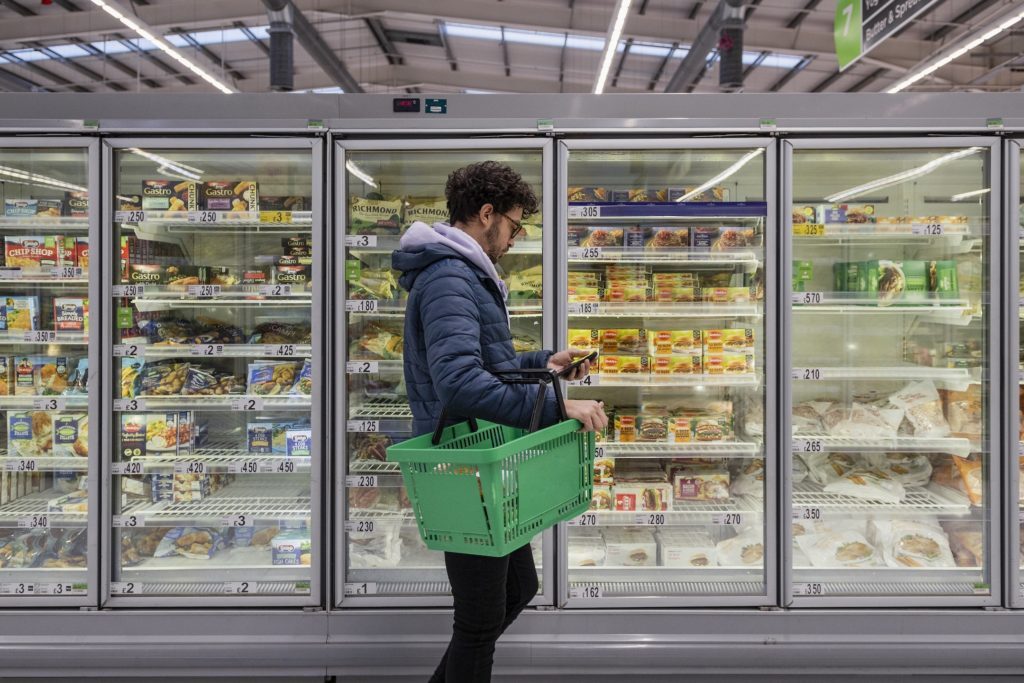This study is going to lead to tons of wowthanksimcured advice for depressed people so I just want to state to anyone out there listening:
My most severe period of depression as an adult happened during a time where I was eating healthfully (almost no processed foods) and doing 5+ days per week of moderate-to-heavy exercise. I didn’t drink or use drugs during that time either. It came on after 9 months of consistency and I powered through two more months, consistently eating right and exercising before it overwhelmed me.
It’s super unhelpful to suggest eating right and exercising to a depressed person if you’re not their licensed medical or mental health caregiver.
The point is that that ultra-processed or unhealthy foods increase the risk for depression in the general public. I get it’s not helpful or correct to tell a person who’s actively depressed to exercise and eat right so they feel less depressed, but exercising, eating right, and getting enough sleep has been the first recommendation doctors and therapists will give to someone seeking a longer-term improvement in their mood for a long time.
I should add that I’m a mental health professional, and in my anecdotal experience, there are different “types” of depression, even if they all meet criteria for MDD. Some people fall into a chasm due to their brain chemistry, and only meds, ECT, TMS, time, or a combination of these will get them out. Sounds like this may be what you experienced. Others (I would say the majority of those diagnosed with depression who land in the hospital) have a more low level depression that can absolutely be improved with lifestyle changes and/or psychotherapy. Point being, I still think this is helpful information for a large segment of those experiencing depression.
No, the point is that there is a correlation between eating processed foods and developing “incident depression” over a 15 year period in mostly white populations of middle-aged women.
The study doesn’t say what you’re already claiming it does because of a headline, and that is what leads to very unhealthy advice given.
The negative mood effects of unhealthy lifestyle choices are well established and not arguable. I’m not making that statement on this study, but rather the entire body of literature showing this to be the case.
The point is that that ultra-processed or unhealthy foods increase the risk for depression in the general public.
This is you, making a false statement that is about the study OP posted, not general “not arguable” bodies of knowledge.
This is harmful, not helpful.
Edit: for those downvoting me, the quote from the person before me is NOT based on decades of non arguable research. It is only based on their opinions, biases, and the headline OP posted.
The study we are discussing opening paragraph says the following:
Despite extensive data linking ultraprocessed foods (UPF; ie, energy-dense, palatable, and ready-to-eat items) with human disease,4 evidence examining the association between UPF consumption and depression is scant.
Unless this random internet person knows more than these researchers, then I’d say that this person is doing the exact harmful thing I was trying to prevent.
Ok, I’ll say it again. The negative mood effects of unhealthy lifestyle choices are well established and not arguable. I’m not making that statement on this study, but rather the entire body of literature showing this to be the case. Sorry there was a misunderstanding.
They’re established to be linked to incidental depression, not clinical. It may help SOME people get out of a tailspin, but those with clinical/chronic depression will not experience the benefits of ‘healthier lifestyle choices’.
Healthy lifestyle choices reduce the incidence of depression at the population level.
If you’re not talking about the study, why did you quote the headline almost word for word?
Then go edit your post to remove the statement that contradicts what you’re saying now.
What I am trying to do is to prevent people from reading the headline and making the false statement that you then made based off of it and using that to try and give advice about diet and exercise to people with clinical depression.
You need to work on your reading comprehension. They clearly state that the claim they’re making is based of decades of research, not simply this headline.
PBS asked Harvard about causation vs correlation and got a long winded answer with no substantive response to the question.
No follow up
PBS asked Harvard how strong is the connection and got no response to that question whatsoever.
No follow up.
Yeah, someone who only has the time to microwave dinonuggets before watching YouTube and going to sleep probably feels worse than the person who has enough time to cook a proper meal for themselves.
Ah man, I can’t imagine not even being able to toss my Dino nugs in the toaster oven. Same amount of work just a bit more time and 1000% better than microwaved. And I’m a depressed fuck. Someone who can’t even muster that much together must really be suffering. :(
Even though they said they controlled for confounding variables, there is definitely not enough information in this article to justify that. They made no mention of socio-economic status which seems like a big one here. Not to mention more depressed people might opt for ready-made processed food because they don’t have the energy to cook a full meal. Does anyone know where to find the full paper? I would need to see that before drawing a conclusion on this one.
Absolutely this. When I’m depressed there’s no way I have the energy to cook or clean up what I cook with. The knowledge of having something to clean while I’m feeling like shit just makes me feel more like shit.
Socioeconomic variables were definitely accounted for in the study:
with adjustment for known and suspected risk factors for depression, including age, total caloric intake, body mass index (BMI; calculated as weight in kilograms divided by height in meters squared), physical activity, smoking status, menopausal hormone therapy, total energy intake, alcohol, comorbidities (eg, diabetes, hypertension, dyslipidemia), median family income, social network levels, marital status, sleep duration, and pain.
Here’s a link to the JAMA letter
Not sure which one is referenced, but here’s a list from google scholar.
Eat shitty food -> feel bad about eating shitty food.
Give me a grant now!
You are truly pushing the limits of science, I’m in awe.
What is an ultra-processed food? There needs to be some definition that is unambiguously applicable, otherwise this kind of study is worthless.
Seriously. Cutting the meat off the bone is processing. Letting something dry is processing. The simple act of tossing something in the fridge is processing. We need some official designations here, and precisely what each processing method does and how it affects us once ingested.
Diet was assessed using validated food frequency questionnaires (FFQs) every 4 years. We estimated UPF intake using the NOVA classification, which groups foods according to the degree of their processing. In secondary analyses, we classified UPF into their components, including ultraprocessed grain foods, sweet snacks, ready-to-eat meals, fats and sauces, ultraprocessed dairy products, savory snacks, processed meat, beverages, and artificial sweeteners.
Here’s a description of the NOVA classification system. At the bottom it says Group 4 foods (UPF) contain one or more of these ingredients:
colour colour stabilizer flavour enhancer sweetener carbonating agent firming agent bulking agent anti-bulking agent de-foaming agent anti-caking agent glazing agent emulsifier sequestrant humectant flavour casein lactose whey hydrogenated-oil hydrolysed-proteins maltodextrin invert-sugar high-fructose-corn-syrup"Bulking agent
Anti-bulking agent"
🤔
Emulsifiers? Egg yolks are emulsifiers, but I guess the chicken is on the hook for the processing.
I recommend you read the details in the link rather than thinking adding eggs makes something ultra-processed. And which bulking agents and anti-bulking agents do you think wouldn’t qualify?
That’s any food that comes in a box or a bag.
So if you can’t afford to shop at the farmers market every other day and buy locally raised and slaughtered meat, you’re more likely to get depressed.
Great use of time and money there. 👍
Are you not able to buy vegetables, fruits, pasta, rice, beans and so on in your local supermarket?
This is a false choice, ultra-processed foods vs farmers’ market produce. Almost any grocery store is going to have produce available for probably cheaper than ultra-processed foods. Bulk carrots, potatoes, onions, celery, zucchini, yellow squash, and more are less expensive per meal than the foods you’re talking about, as are beans, pasta, rice, and more
Buying from the bins (bulk purchasing) is all I ever do or will do, so beans and pasta, even nuts, are redonk cheap in comparison (thank you WinCo), and we’re doubling the size of the vege garden this year. It’ll be another year or two until we can make it pretty, but I’ll take function over from anyday. I want to can an entire pantry by this time next year.
1/3rd of your life is spent on buying food.
I want that to be as close to zero as possible. I want all my costs to be as close to zero as possible. I fucking hate the despair of not having money.
The farmers market quip was hyperbolic to drive a point, but for reals I have some serious issues and concerns over buying produce that’s out of season and not local. Like how apples and oranges are kept in anaerobic environment (prob nitrogen or argon) for 6-12 months before being shipped out, to make sure there’s a year supply
Sure, it might be ‘fine’, but if I have the option to, like right now, buy pomegranates instead of nitrogen-doped pink ladies, I’m going with the seasonal
Only exception to that that I can think of is bananas, cuz Iceland
Lactose? Whey? So raw milk straight from the udder is ultra processed?
Please, everyone read the link before thinking one of these ingredients makes something an UPF. No, whey and lactose don’t make milk ultra processed. Whey and lactose being extracted from milk and then added to something else make something ultra-processed
You should clarify that in your comment then, because you only listed the one criteria and that makes people think it’s the only criteria.
I posted a link to the full description of the NOVA criteria. You think I should have copy/pasted the entire page for you? When you read the ingredients on a milk jug, you will notice is doesn’t say “lactose” or “whey.”
So like… anything you’re not cooking from scratch yourself. And even a lot of things you are, like any baked good would qualify as ultra-processed due to sweeteners and emulsifiers (e.g. egg).
Read the link 😑
Eggs are a primary ingredient. If you see “emulsifiers” on an ingredient list, it is dioctyl sodium sulfosuccinate, acetylated monoglycerides, polyglycerol esters of fatty acids, or diacetyl tartaric acid esters of mono- and diglycerides, as a few examples. It is not “eggs.”
There are lots of baked good that do not meed the UPF criteria. If you read the link you can see for yourself.
There is more difference between those ingredients than commonalities.
Color, sugar and whey are being treated the same?
The entire definition of “processed food” is stupid and useless. Which ingredients are the ones causing problems? Because I guarantee you that a little bit of lemon or vinegar used as a “preservative” isn’t going to impact one’s diet as badly as 1/2lb of sugar in soda.
If you think the list above equates a little bit of vinegar to half a pound of sugar, you definitely didn’t read the article I linked about the NOVA classification system
Oh, I did. It was as empty as the calories in junk food.
They basically created arbitrary rules that put foods in whatever categories they wanted them to be in.
The ingredients for those groups are way too diverse to be helpful. And it’s not really about the ingredients since “natural” foods don’t get dinged for having ingredients which others do
It’s useless.
The study found an association, and cannot find causation. So it could be that eating more ultra-processed foods leads to a greater risk of depression, or that depression leads to eating more ultra-processed foods, or that something else entirely causes both. The article seems to assume it’s only the first possibility without mentioning the others, which makes me think this is not worth reading.
The actual paper discusses the reverse causation hypothesis and using data over a 4 year period: https://www.ncbi.nlm.nih.gov/pmc/articles/PMC10512104/
You are doing (a) god’s work. Unfortunately, most people have a naive understanding of how science is done in medicine and don’t understand the value of cohort studies.
If you are depressed, you don’t have the energy or motivation to process food yourself, so you eat (pre-)processed food.
We don’t really understand what this is about yet. Processed foods tend to offer a big sugar hit, a brain chemical rush. It’s no surprise that people struggling with depression will reach for a chemical rush. It’s also no surprise when they’re constantly squeezing their brain for it that the brain runs dry.
But this means we have the same issue as we do with all behavioral addictions: what is the underlying issue that leads us to use in the first place? Did junk food alone make me depressed? Or did I start binging junk food during my depression, which made the depression worse? Can anyone safely binge eat junk food without getting depressed? Can you? How long?
deleted by creator
“found a link between”? Please demonstrate statistical significance via null hypothesis rejection.
Downvotes all you want, this is standards statistics for demonstrating correlation
Compared with those in the lowest quintile of UPF consumption, those in the highest quintile had an increased risk of depression, noted for both strict definition (HR, 1.49; 95% CI, 1.26-1.76; P < .001) and broad definition (HR, 1.34; 95% CI, 1.20-1.50; P < .001) (Table). Models were not materially altered after inclusion of potential confounders. We did not observe differential associations in subgroups defined by age, BMI, physical activity, or smoking. In a 4-year lag analysis, associations were not materially altered (strict definition: HR, 1.32; 95% CI, 1.13-1.54; P < .001), arguing against reverse causation.
“Found a link between” typically is pop science speak for small p value. Not that I would take it for granted that it does, so you should just read the paper if you have a question about the details: https://www.ncbi.nlm.nih.gov/pmc/articles/PMC10512104/
Thank you. I was definitely a bit salty yesterday for unrelated reasons.
deleted by creator
Realism is pessimism.
All things in your life maybe, but definitely not all things.








